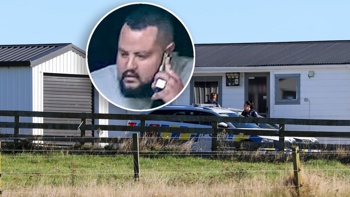Frustrated and demoralised doctors continued to press for better conditions to turn the tide on what they say is Northland’s struggling healthcare.
Doctors from public hospitals and health facilities, and dentists belonging to the Association of Salaried Medical Specialists (ASMS) carried out a second strike nationwide on Wednesday.
Union members want pay increases in line with the consumer price index in order to attract more staff to unfilled roles that are applying pressure to the current health workforce.
But Te Whatu Ora remains resolute that it has put all it can on the table as to invest more would involve having to make funding reprioritisations elsewhere.
Whangārei emergency medicine consultant Dr Gary Payinda said public hospital doctors, like other Kiwis, have lost around 11 per cent of their “real” salaries to inflation in the last few years.
“In that time we’ve had to do more work to compensate for the 1700 unfilled doctor vacancies that are in the country right now,” Payinda said.
“So we’re working more, seeing more, doing more, taking much more additional duties on our days off but we’ve reached the point where we can’t keep doing that indefinitely.”
Whangārei emergency medicine consultant Dr Gary Payinda. Photo / Michael Cunningham
Payinda said they are asking for a 6.5 per cent increase over a 12-month period, whereas ASMS chief executive Sarah Dalton told NZME that Te Whatu Ora is offering a 17-month term and that the “percentages they are claiming don’t stack up”.
Te Whatu Ora has offered senior doctors and dentists salary increases over the next year of between 7 per cent and 12.9 per cent - an increase of between $15,000 and $26,000.
Payinda stressed that people needed to understand that their healthcare is at risk and “enough is enough”. He claimed by the time the run-down Whangārei Hospital is rebuilt, it will already be not fit for purpose because of the region’s rapid growth.
“We haven’t been listened to for so many years about real understaffing issues and we just feel it’s going nowhere.
“Every day we’re seeing the harm that brings to patients. Whether they’re waiting 12 to 24 hours for admission or every time they have to wait 12 months to get an MRI, we just know we can do better but we need adequate staffing.”
The ASMS strike was the first in union member and obstetrician and gynaecologist Dr Ian Page’s 44-year career. He was motivated to stand his ground alongside roughly 40 others because he wanted the “health service to continue” and without change “it won’t”.
Association of Salaried Medical Specialists (ASMS) members from Whangārei Hospital strike for better pay and working conditions. Photo / Michael Cunningham
“We want the public to have a health service to be proud of that will give them the right level of care for the future. We’re struggling with it now and it’s getting worse.”
In the last 20 years, Page has seen the job become “much harder” as expectations had gone up considerably, illnesses had become more complex requiring longer treatment times, and staffing levels were inadequate.
He said Whangārei Hospital has a 25 per cent vacancy rate for consultants and 33 per cent for the general medicine department.
Obstetrician and gynaecologist Dr Ian Page. Photo / Michael Cunningham
“That’s a huge problem because the establishment isn’t what it needs to be for the needs of the population.
“The population’s grown, they’re getting older, they’re getting more ill so the amount of healthcare that needs to be provided is going up but the establishment has not gone up to match that.”
Page said the situation was “quite demoralising after a while”.
Whangārei Hospital clinical microbiologist and ASMS member Dr David Hammer said he studied for 20 years and has four qualifications in order to do his job.
He liaises between the laboratory bench and the patient beside, advising teams what to do with lab results. Part of his role is “fighting superbugs” and keeping them out of the hospital alongside infection control staff.
“[...] We have taken pay cuts effectively for the past couple of years, we are seriously understaffed at the moment and the pull of Australia is really huge,” Hammer said.
Whangārei Hospital clinical microbiologist Dr David Hammer. Photo / Michael Cunningham
“That’s why fighting over $1.17 after tax is just nuts.”
Te Whatu Ora’s stance remains unchanged in the wake of the second strike. However, Te Whatu Ora chief people officer Andrew Slater said Te Whatu Ora remained committed to reaching a settlement with the senior doctors’ union.
“We will be going back to mediated talks with the union next Tuesday, September 19, with this in mind.”
Take your Radio, Podcasts and Music with you

/cloudfront-ap-southeast-2.images.arcpublishing.com/nzme/THBNMAY3JNDKTKMQBFHCGMSXBU.JPG)
/cloudfront-ap-southeast-2.images.arcpublishing.com/nzme/7X5UWL2MR5HIVDNNHPAW5GZUNY.JPG)
/cloudfront-ap-southeast-2.images.arcpublishing.com/nzme/QGNUBT3YMFGZTOK5NK36AGPOZE.JPG)
/cloudfront-ap-southeast-2.images.arcpublishing.com/nzme/Z2KQTYK3IBHPPJPPHGJ7P36APA.JPG)








